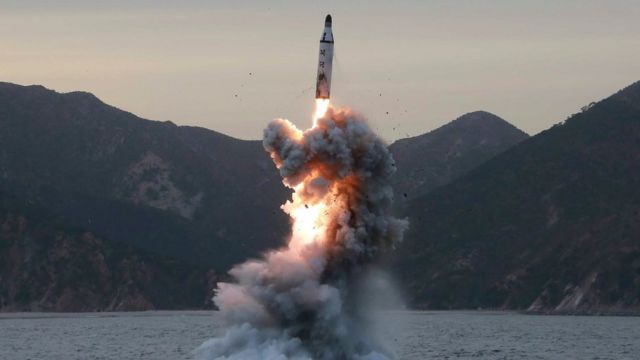
South Korea’s Joint Chiefs of Staff (JCS) reported that the North launched several short-range ballistic missiles from South Pyongan province, further escalating already tense relations on the Korean Peninsula. The launch, detected at around 6:50 a.m. in the Kaechon region north of Pyongyang, comes amid a series of recent provocations by the North Korean regime.
The JCS did not provide details on the exact number of missiles fired or where they hit, although it is estimated that the projectiles flew approximately 400 kilometers to the northeast. This development comes as North Korea escalates its militarism and has raised concerns both in the South and among its allies, including the United States and Japan.
Tensions in the region intensify
The situation has become even more delicate following last week’s revelation of a uranium enrichment facility in North Korea, which has heightened fears over the country’s nuclear capabilities.
Kim Jong-un’s regime has repeatedly demonstrated its intention to strengthen its nuclear arsenal, despite international sanctions and warnings from the global community. The facility, based on uranium enrichment, indicates worrying progress in the country’s development of nuclear weapons.
In a text message sent to the media, the JCS strongly condemned the recent launches, describing them as a “clear provocation” that endangers peace and stability on the Korean Peninsula. In addition, the South Korean military announced that it will share information with its counterparts in the United States and Japan, and maintain a vigilant posture to prevent further incidents.
Amid concerns about rising tensions, the South Korean government called an emergency meeting to assess the situation and coordinate an appropriate response. Yin Sung-hwan, the second deputy national security adviser, led the session, which discussed the current state of relations with North Korea and possible responses to the regime’s military moves.
Japan, for its part, has also stepped up its vigilance, making its position clear and expressing concern about North Korea’s actions. Japanese Prime Minister Fumio Kishida has repeatedly stressed the importance of close trilateral cooperation between Japan, South Korea and the United States to counter the threat posed by the North. Japan has also reiterated the need for a diplomatic resolution that includes greater control over North Korea’s nuclear activities.
The political background
The missile launch and the disclosure of North Korea’s nuclear facility come in a complex international context. With the US presidential election just months away, there is concern that North Korea is using these provocations as a strategy to attract the attention of the international community and obtain diplomatic concessions. Historically, Pyongyang has resorted to similar tactics before key political events on the global stage.
In addition, cross-border tensions between the two Koreas have escalated in recent months due to the multiple launches of balloons filled with garbage from the North to the South. These seemingly symbolic acts have served as a signal of defiance by North Korea and have generated additional friction between the two countries.
Yogiyo launches South Korea’s first food delivery robot service
The implications of advances in North Korean military technology
North Korea’s military arsenal has evolved considerably in recent years. In July, Pyongyang fired two ballistic missiles into the East Sea, one of which flew about 120 kilometers before disappearing from radar, likely falling inland.
In addition, North Korean state media reported that the country had tested a new missile from the Hwasong family, known as the Hwasong-11Da4.5, with the capacity to carry a warhead of up to 4.5 tons. Although another launch was planned later that month, it reportedly did not take place.
This increase in missile testing and military capabilities reflects North Korea’s desire to consolidate its position as a nuclear power, despite international opposition. Advances in its ballistic and nuclear technology pose a direct threat to regional and global security, and have led to renewed discussions about the need to strengthen defensive measures in South Korea, Japan and other allied countries.
As North Korea continues to defy the international community with its provocations, the region is in a state of uncertainty. The actions of Kim Jong-un’s regime underscore the fragility of relations on the Korean peninsula and raise questions about the future of security in East Asia.
For now, South Korea, Japan and the United States are maintaining a vigilant stance, and diplomatic talks to reduce tensions are at a standstill. The world is watching with concern for Pyongyang’s next move, and the international community must decide whether to continue to pressure North Korea through sanctions or seek a diplomatic path to mitigate the risk of a military escalation in the region.
Source: https://reporteasia.com/relaciones-diplomaticas/defensa/2024/09/19/crece-tension-peninsula-coreana/

